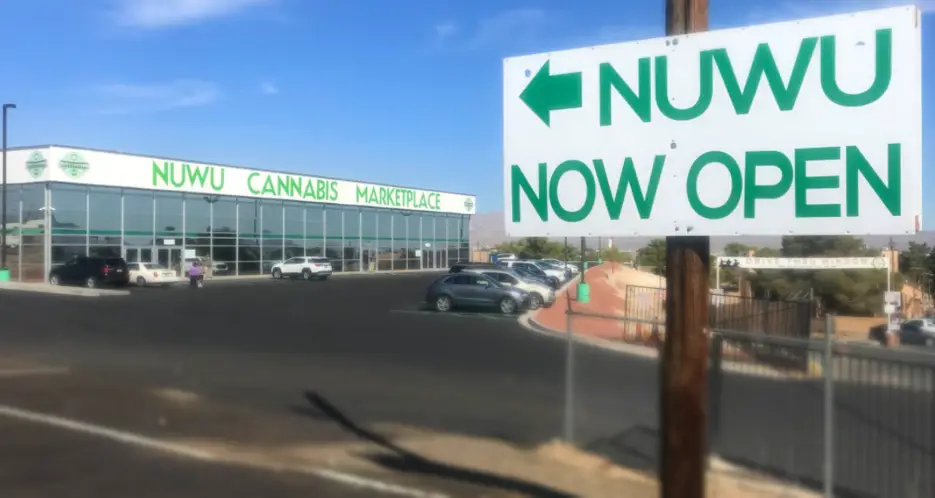News
Sales at the World’s Largest Cannabis Store Benefit the Las Vegas Paiute Tribe — NOT Govt

Nevada’s choice to green light recreational green, cannabis, might be an awkward compromise on the road to eliminating State interference with one of nature’s most potent medicinal and pleasurable plants, but the latest state’s choice to do so has nonetheless provided a veritable font of opportunity for the Las Vegas Paiute Tribe — which just opened what is being billed as the “largest marijuana store on the planet.”
OK, it’s fair to say the Tribe’s new customers benefit handily, as well, and — for those opposed to the government’s fingers digging too greedily from the overflowing taxation cookie jar naturally accompanying the choice to legalize weed — the Paiute Tribe, not the State, benefits from the tax proceeds earned in sales at the 15,000 square-foot dispensary.
Local FOX5 reports the massive store, NuWu Cannabis Marketplace on Paiute Circle, sits off Main Street and Washington Avenue — an area of Las Vegas it says many non-Native locals hadn’t even realized was tribal land.
“NuWu actually means ‘the people,’” explained Las Vegas Paiute Tribe Vice-Chairman Chris Spotted Eagle of the choice of name for the dispensary, which ultimately plans to remain open 24 hours and implement a drive-through service.
Just four months into the state’s recreational cannabis experiment and already the feds have promulgated threats to shutter Native American weed businesses under the anachronistic and draconian façade of federal marijuana prohibition — the same stale and unpopular front Washington pols occasionally tout when passing rights-crushing legislation.
“[We] would enforce federal law on Nevada tribes, because the US Attorney General would provide the necessary warrants,” Laurie Thom, Council Chair of the Yerington Paiute Tribe, recalled having been told by an official from the U.S. Department of Interior’s Bureau of Indian Affairs, who had added plainly, “Don’t do it.”
But many of Nevada’s Indigenous Peoples have bucked the murky warning, instead choosing to take a chance on the same prosperity flooding legal cannabis states like Colorado and Oregon. And, although the 32 Indigenous tribes and nations aren’t beholden to Nevada’s laws regarding pot, the Las Vegas Paiute Tribe chose to model its own business structure similarly.
“We regulate ourselves, but it’s pretty much a mirrored image of Nevada,” Tribe Chairman Benny Tso said of the colossal pot shop in downtown Las Vegas. “I know we’re under a microscope,” he added of the ubiquitous federal crackdown threat, “so I think our regulations and our restrictions are a little bit tighter than the states’ … We just want to be in the business just like everybody else. We want to be fair.”
That fairness had to be edited into the Tribe’s drug-testing policies — about which Tso laughed, telling FOX5, “I actually bought the first product out of our store. I bought some Willie’s Reserve and Skywalker OG” [specific cannabis strains, for the uninitiated].
Tribal leaders’ laughter and lightheartedness should not be mistaken as blithe, considering the diligence and persistence expended to open the nation’s largest cannabis dispensary — and that, upon Native American land.
“This is a huge deal,” Jason Sturtsman, an expert in the cannabis industry, told the local NBC News affiliate. “This is a focus point for other Native American tribes to look at this dispensary and look and see what the Paiute Nation has done here.”
Famously or infamously, Indigenous Peoples and Native American Tribes located inside the borders of the U.S. have turned to legal gambling to attract tourism dollars to ailing economies; but gaming frequently brings additional problems. Cannabis offers a lucrative alternative to bolster funds to be allotted toward healthcare for members and other solutions — without the myriad ills so associated with casinos.
Not having to fork over cannabis taxes to the State means dollars have a better chance of circulating within tribal bounds — in short, going where funds are most needed.
“We want the dollar to roll around in our tribal community before it leaves the reservation,” Tso asserted.
Typos, corrections and/or news tips? Email us at Contact@TheMindUnleashed.com
